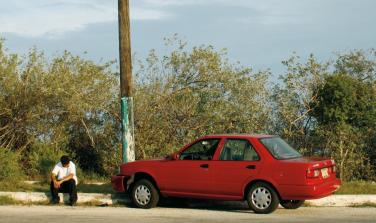
Lake Tahoe, Fernando Eimbcke, Mexico, 2008, 85’, OV in Spanish
It would be not at all hare-brained to describe Lake Tahoe as an anti-road movie. In the first minute of the film, 16 year-old Juan’s red Nissan crashes into a post. That happens in off, it is heard over a dark frame, and is not seen. The basic tenets of the film are set from that very instant. On the one hand, the absurdity of a road-movie kicking off now that there’s no car, like a circular, loop-like journey, which Juan now undertakes to recover the vehicle; on the other, the minimalist grammar employed by Mexican director Fernando Eimbcke, which evokes the world of Jarmusch in Permanent Vacation (1980) or Stranger than Paradise (1984), interspersing cuts-to-black to separate scenes, thereby giving the film an episodic character, almost like comic book drawings. The use of cinemascope and wide angle lenses, like in a deconstructed western, throws into even sharper focus the peculiarity of this universe which seems to be perversely put into place to prevent Juan from achieving his objective. But as Ricardo Piglia says in Thesis on Story, “a story always tells two stories”, and Juan’s aim is not what it seems, though he himself probably doesn’t know it. Within that maze of encounter, mis-encounter and elusive car parts, there is an underlying current, a coded story, delicately woven, with brush-strokes of humour, which reaps and sows with infinite tenderness the pain, loss and vulnerability of the inevitable process of growing up.
It would be not at all hare-brained to describe Lake Tahoe as an anti-road movie. In the first minute of the film, 16 year-old Juan’s red Nissan crashes into a post.
